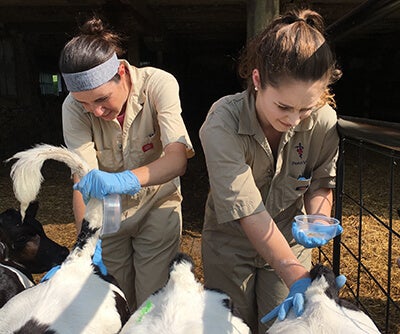Student Programs

We have an established summer student program that allows students from various disciplines to learn multiple skills and participate in:
- Lectures and discussions: Students attend classes and conversations with scientists, clinicians, and faculty from the Department of Clinical Studies to learn about the research experts are performing at the bench and the solutions they are seeking to apply in the field.
- Lab access: Through guided, inquiry-based experiments, students get a hands-on introduction to some of the tools and techniques commonly used in biomedical research. These include wet lab techniques such as DNA and RNA extraction, in vitro fermentation, and PCR.
- Journal Clubs and individual projects: Students discuss peer-reviewed research articles in small group journal clubs, where lessons from lectures and labs are applied to current biomedical research. Skills such as scientific writing, presentation skills, and targeted projects will provide the students with valuable abilities for their future. Students will be involved in bioinformatics and data analysis using a variety of programs and analysis tools from the most cutting-edge platforms.
The central focus for all students is to better understand the role of microbiota and how this information can be linked to problems faced by livestock production systems integrated with the environment and human health.
Students are assigned their own projects to undertake under supervision from our research technicians and scholars and are included on relevant publications.
Interested students can email Meagan Hennessy to be contacted as the summer gets closer.

Testimonials from previous students:
“Working in the ASMG Lab at New Bolton Center has provided me with an experience that has enhanced my education in the sciences and has better prepared me for my future career as a large animal veterinarian. The work done at ASMG allows me to take part in graduate level research that I otherwise wouldn’t encounter as a high school student, allowing me to practice and perfect laboratory skills that I would learn as an undergraduate and/or graduate, along with learning new information about animal care and nutrition (specifically dairy cows), through others in the lab. The lab work is primarily independent (working on smaller portions of larger projects), however the community of people in the lab itself provides a supportive and efficient net for people such as myself who are working in a lab for the first time.”
“This summer I worked under Dr. Dipti Pitta at the Agricultural Systems and Microbial Genomics Lab at PennVet’s New Bolton Center. My project was to investigate the effects of withholding feed on the equine fecal microbiota, and my time in lab was primarily spent extracting RNA from equine fecal samples. I learned many valuable techniques such as RNA extraction using a protocol of chloroform and isopropanol, using commercially available kits such as VILO to convert mRNA to cDNA, PCR amplification, running gel electrophoresis, and I also learned the steps involved in statistically analyzing sequencing data in R software. This experience exposed me for the first time to working in a benchtop laboratory, and I really enjoyed the persistence and determination involved in this kind of research. This experience has further encouraged me to pursue a career in academia after I graduate veterinary school, so that I can split my time practicing clinically and working in a laboratory.”
“During my time at the ASMG lab, I worked on a project studying the effects of feeding time on ruminal community dynamics and methane mitigation. This project included objectives studying the rhythmicity of ruminal archaeal communities, the effect of feeding time on said dynamics, as well as studies on inhibiting the MCR enzyme and how enzyme levels could possibly be used as a proxy to monitor methane emissions. Through this research I learned new techniques of nucleic acid extraction, utilizing barcoded primers in PCR amplifications, PCR quantification, as well as some basic knowledge regarding qPCR. This experience provided me with a solid foundation in microbial and nutrition research. If my current career plans of pursuing a nutrition residency continue to grow, this experience will give me a great advantage and will serve to set my application apart from other candidates that lack a similar research opportunity or experience.”
For more information contact Meagan Hennessy at hmeagan@vet.upenn.edu.
